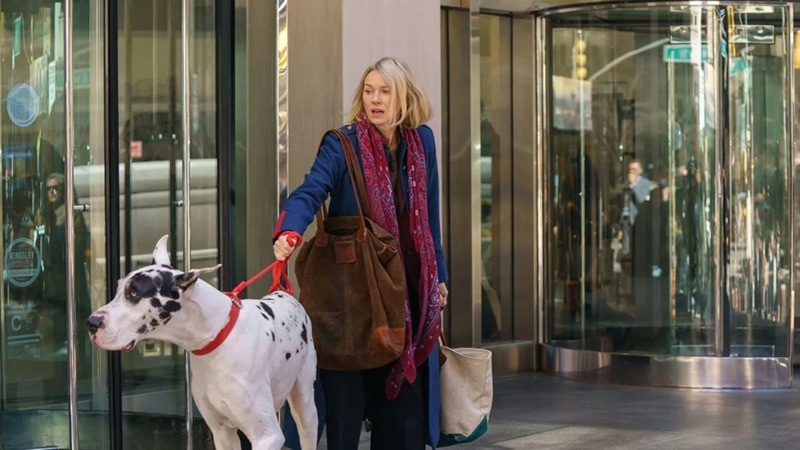Naomi Watts Grapples with a Great Dane and Greater Grief in The Friend

Grief’s dull, persistent ache informs much of Scott McGehee and David Siegel’s The Friend, yet it’s soothed by watching Naomi Watts buddy up with the world’s best dog. Based on Sigrid Nunez’s celebrated novel, this New York-set dramedy follows Iris (Watts), a frustrated writer who inherits a Harlequin Great Dane named Apollo (performed enormously and marvelously by Bing) from her late friend and mentor Walter (Bill Murray)—a sitcom premise set loose in a dignified space. As Iris grapples with her new housemate, an inventory of the small, aggravating moments that come in the aftermath of an incomplete life begins to take shape. There are also some really nice scenes with the dog.
“Inherits” is a deceptive way to describe how Apollo enters Iris’s life. Walter’s widow, Barbara (Noma Dumezweni), initially foists the dog on her using stuffy crisis language (“He needs to be ‘re-housed'”), then claims she isn’t a dog person (the same goes for Iris, who prefers cats). Barbara attempts to hand-sell the poor pooch by highlighting his best traits—he obeys, doesn’t trash furniture, and knows to stay off the bed—only one of which is true. When Iris declines, Barbara twists the knife: Iris taking Apollo was Walter’s dying wish, she claims; whether or not it was (he left no note or will), this hits Iris’s grief in that delicate place where Walter exists not just as her best friend but as a former lover.
The Friend asks, often with a good-natured smile, what can and must be salvaged from tragedy, and how we make room for this hazmat effort in a hectic life. Walter’s death, by suicide, hits at the worst moment in Iris’s professional life: She’s grappling with writer’s block, and her latest novel, Eastern Bloc, is stashed in a closet. She teaches a contentious group of aspiring rockstar authors while anxiously sidestepping urgent work she inherited from Walter before his passing: editing a collection of correspondences between Walter and the remarkable people in his life—mostly women—whose publication has now become a top priority for her publisher. Hardly the stuff of comedy, though McGehee and Siegel manage to keep things surprisingly light.
Let’s revisit Barbara for a moment. Her insistence that Iris take Walter’s dog raises the question: What did the mentor truly mean to his acolyte? Later, in a lovely scene with his ex, Elaine (Carla Gugino), Iris confides that Walter once seduced her with his magnificent words. It happened only once, and it took her some time to realize she loved him as a friend anyway. Yet this story raises more questions: Why did Walter discuss the size of Iris’s apartment and the pace with which she works (slowly) with so many of his other wives? If Barbara is to be believed, why did he decide that Iris should take Apollo over every other woman in his life? The literary approach dictates that we consider Apollo a representation of Walter, a familiar, looming, sad-sack presence in her life that gently nudges her toward doing the things that are difficult but right. That’s all well and good, but he’s still a very large dog taking up her entire bed.
Where does this leave Walter? In the past. Turns out his pass at Iris wasn’t his first. Accusations of “misconduct” at his school prompted early retirement. In Nunez’s book, Walter’s history with women (including his many flirtations with students) plays a larger role; Iris reflects on his womanizing and the generational shift in tolerance for his behavior within academia and the broader literary world. The Friend in McGehee and Siegel’s hands takes a significantly less messy approach to Walter’s character. In the film, Iris has knots from Walter’s past to untangle, but they come loose rather obligingly.
-

-

-

-

-

-

-

-

-

-

-

-

-

-

-

-

-

-

-

-

-

-

-

-

-

-

-

-

-

-

-

-

-

-

-

-

-

-

-

-








































